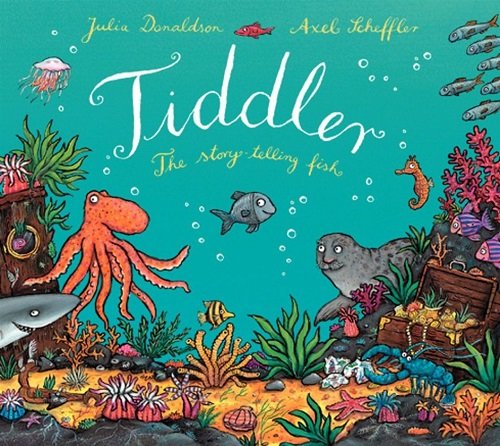
Tiddler
- concept of time
- describing
- labelling ocean animals
Review
A modern take on ‘The Boy Who Cried Wolf’. Tiddler is a tiny fish with a big imagination. He is frequently late for class and loves to tell tall tales as excuses. Neither his teacher nor his classmates believe his elaborate stories, but will they believe him when one of his crazy tales actually comes true?
Tiddler is written in delightful rhyming text. There is much to discover and describe in the vivid, detailed illustrations. This book is a fantastic choice for teaching children about ocean animals as there is a wide variety illustrated and labelled throughout the book. There are also multiple opportunities to teach the concept of time and days of the week. Children can have a go at reading the time on the clock each time we visit Miss Skate’s classroom during the story.
For further speech and language targets in Tiddler, see the list below.
Book Details
Narrative Structure: Complete Episode
Story Plot: Character Flaw
- animals - ocean, fish
- excuses
- honesty
- imagination
- places - ocean
Speech and Language Targets
- /d/ - dive, dolphin, day, Monday, Tuesday, Wednesday, mermaid, told, rode, found, heard, friend
- /f/ - fish, fishermen, fishing
- /l/ - late, little, lost, lobster, silly, turtle, tale, whale, eel
- /m/ - Monday, Miss, mermaid, fishermen, swim, home
- /r/ - ride, ray, rescue, sorry, story
- /s/ - sorry, seahorse, seal, save, Miss, yes
- /s/ blends - story, starfish, school, Skate, small, swim, scales, squid, strange, lost, chest
- /sh/ - ship, shiver, shoal. shrimp, fishing, fishermen, fish
- /t/ - Tiddler, tales, Tuesday, told, turtle, late, net
- conjunctions (and, but)
- copula (was)
- negatives didn't
- regular past tense
- irregular past tense verbs (blew, swam, told, lost, flew, heard, rode, met, took)
- subjective pronouns (I)
- action verbs
- matching
- labelling
- describing
- predicting
- explaining means to a goal (e.g. what can Tiddler do to get back home?)
- identifying obstacles to an action (e.g. what might stop Tiddler from getting home safely?)
- making inferences (e.g. how does Tiddler feel? How can you tell? *He shivered in the seaweed)
- temporal concepts (days of the week, time)
- excuses
- honesty
- traditional opening
- character description
- time
- initiating event
- problem
- plans
- resolution
- moral
- dialogue
- rhyme
Book Info
Published by Scholastic in 2010 (ISBN: 9781407116631)

